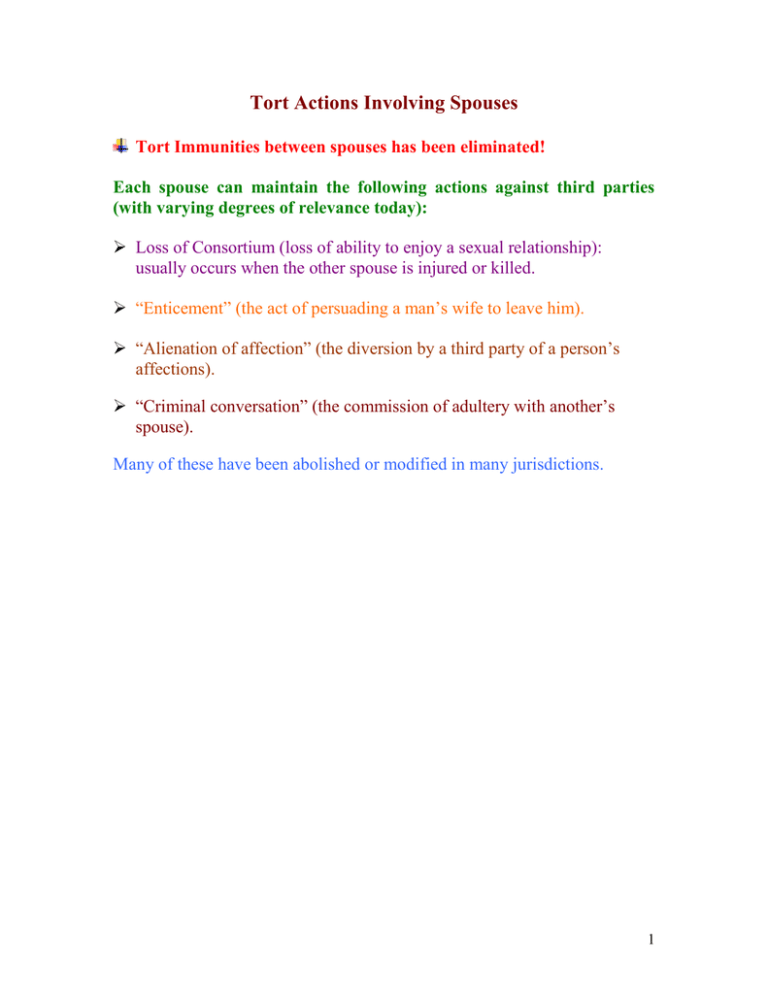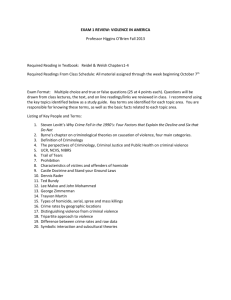
Tort Actions Involving Spouses
Tort Immunities between spouses has been eliminated!
Each spouse can maintain the following actions against third parties
(with varying degrees of relevance today):
Loss of Consortium (loss of ability to enjoy a sexual relationship):
usually occurs when the other spouse is injured or killed.
“Enticement” (the act of persuading a man’s wife to leave him).
“Alienation of affection” (the diversion by a third party of a person’s
affections).
“Criminal conversation” (the commission of adultery with another’s
spouse).
Many of these have been abolished or modified in many jurisdictions.
1
Domestic Violence: Between Spouses
Spousal Rape
- Legal doctrine that did not require consent for marital sex has been
eliminated in all jurisdictions.
- Many jurisdictions require greater evidence or place certain
procedural safeguards in spousal rape cases.
Special Protections Against Violence Between Spouses:
- Many states increase severity of assault punishments if they are
domestic violence cases.
- Federal “Violence Against Women” Act creates a federal civil
cause of action on the grounds of domestic violence.
- Availability of restraining orders to be sought ex parte against
abusive spouses.
- “Battered Women’s Syndrome” available sometimes as a defense
or mitigation against a criminal charge.
2
Domestic Violence: Children
-
Violence against children, especially sexual abuse, is punished more
severely than against adults.
-
Family Violence civil and criminal statutes apply to children as well
as spouses.
Corporal punishment of children in schools:
-
banned in about half of the states.
-
where allowed, it must not be excessive and there are certain procedural
safeguards, such as the presence of a witness.
Corporal punishment of children by parents or guardians:
-
Allowed to some to degree in all states.
-
Specific exceptions made in state criminal codes to exempt parents
using reasonable discipline from state assault charges.
-
Must be reasonable! Any “excessive” or “unreasonable” corporal
punishment will eliminate the protection granted parents and the parent
can be punished as harshly as would be a stranger for a similar action.
3
Torts Committed by Minors
Modern Rules:
-
A minor of any age can be liable for intentional torts as long as they’re
old enough to form an intent.
-
Children can also be liable for negligence; but only if their behavior did
not rise to the level of a reasonable child of similar “age, experience and
intelligence.”
-
When engaging in an “adult activity,” (i.e., something dangerous
enough that it is generally considered unsafe for children) a child must
live up to the standard of a reasonable adult or be liable for negligence!!
Parents’ Liability for Children’s Torts
-
Many states today make parents responsible for parents’ torts, especially
intentional torts, but only up to a certain point.
-
Aside from vicarious liability, negligent supervision can be a cause of
action against the parent him or herself!
-
Family Purpose Doctrine regarding family cars.
4


